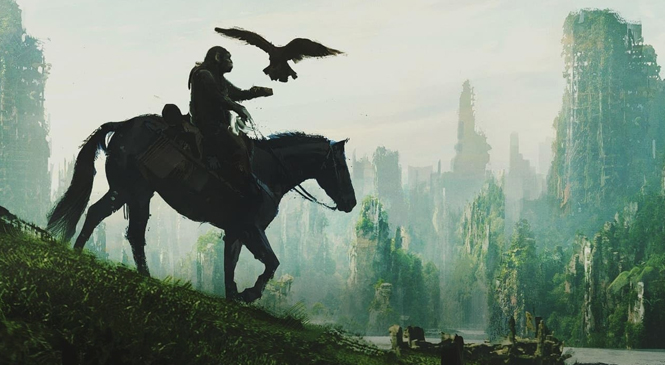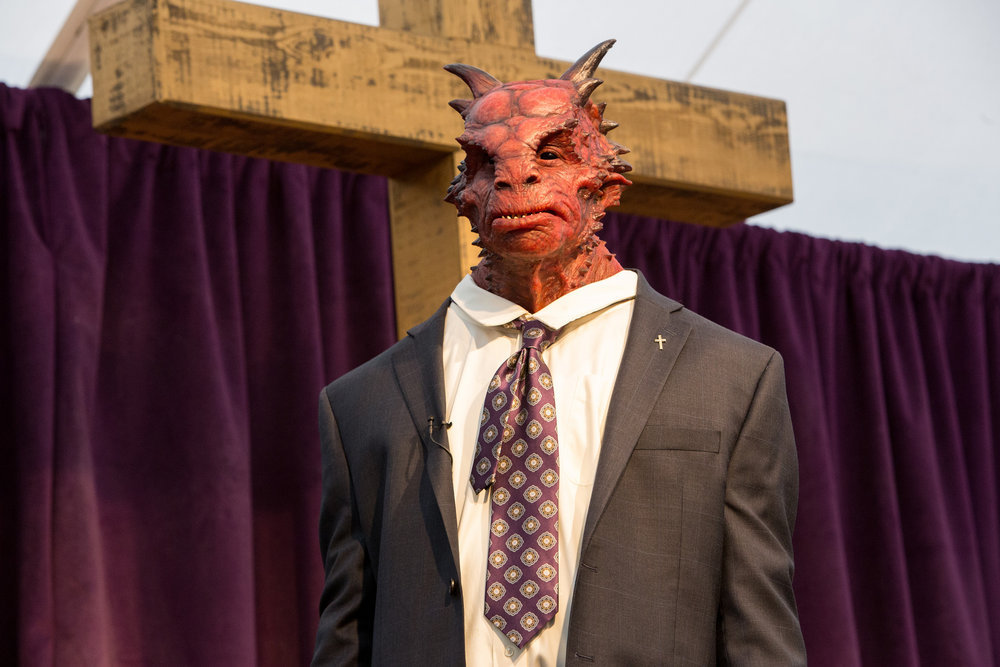Film Review: APES Leaps the Franchise Ahead

 Kingdom of the Planet of the Apes (2024)
Kingdom of the Planet of the Apes (2024)
Screenplay by Josh Friedman
Based on characters created by Rick Jaffa & Amanda Silver
Produced by Wes Ball, Joe Hartwick Jr, Jason Reed, Rick Jaffa, Amanda Silver
Directed by Wes Ball
PG-13, 2hr 25m
This one is getting mixed responses from various quarters, and I’m later than I should have been for posting my reaction to this film, so let’s dive in.
After a very brief funeral for Caesar, we jump ahead “many generations later” — I’ve read it’s about three hundred years — and we pick up the story with Noa (Owen Teague), a young chimpanzee belonging to the Eagle Clan. They train eagles to fish and hunt with them, and Noa’s father, Koro (Neil Sandilands) is the leader of the clan, and he has a way with the birds that seems to escape Noa, even as the youngster and his two friends are about to participate in a ceremony that bonds them to eaglet eggs that they’ve retrieved after climbing high up to nests in the wild (this will come into play later).
After a mishap caused by a sneaky “echo” (the apes’ name for humans), Noa loses the egg he’s been carrying around like some of us did back in Home Economics, and so he ventures out from the clan’s home, only to find the bodies of apes that have been attacked by other apes in search of a particular human. Finding Noa’s horse, they follow it back to his village, which is in ruins by the time he arrives.

Thus, we have our setup — Noa must travel to locate and rescue his clan from the “masks” that have taken them. It’s a story beat we’ve seen before in War for the Planet of the Apes as Caesar had to rescue his clan from The Colonel. This time, as others have pointed out in reviews, Noa’s quest almost has Biblical beats. And Noa is very much on a spiritual journey, as he learns from the orangutan Raka (Peter Macon) about the original teachings of Caesar. Raka is very much of a mind that apes can co-exist with humans, a belief he tries to get Noa to understand when they encounter an echo Raka calls “Nova” — and there’s a nice in-universe joke that calls back both Amiah Miller’s mute Nova in War as well as Linda Harrison’s original Nova back in 1968.

Turns out, to Raka and Noa’s surprise, Nova is actually Mae, and she’s among the rare group of humans who still have their ability to reason and speak after all this time. And she has a goal, one that involves an old military vault that currently sits in the middle of the “kingdom” built by Proximus Caesar (Kevin Durand), who has twisted the original Caesar’s teachings for his own gain. He’s after power, and he thinks he’ll get it with what’s in the vault.
Any more and I could be giving away too much.

One thing I caught that no one else seems to be talking about is the theme of this film. It’s almost like everyone has missed it among all the discussion about whether or not we even need this movie, or whether it jumps ahead far enough, or whether it’s getting us closer to closing the loop with the original Heston film.
Throughout Kingdom, we see all the main characters dealing with the question of trust. From the very first scene to the last, we get situations wherein Noa, Raka, Mae, Proximus… all of them have to decide if they trust various other characters. Noa has to decide about Raka, then Mae. Mae has to decide about Noa and Raka. Proximus trusts Trevathan (William H. Macy), but should he? And can Trevathan be trusted or has he sold out?
Some of this goes well. Other times it doesn’t, and some of those times might be unexpected. I think it’s a layer of the movie that’s getting missed by a lot of people, and it’s definitely worth further discussion.
The relationship between Noa and Raka is reminiscent of other hero’s journey combinations: Arthur and Merlin, Luke and Obi-Wan, Frodo and Gandalf — and we probably could have stood to see more of it as Noa came into his own. It feels like there’s more that could have been explored in this thread, especially with Raka being the acolyte of Caeser’s true teachings. Noa should have been asking more questions about what apes have been taught. What aspects of the law are true and what have been corrupted over time? And just how far (if any) has Proximus strayed from the truth?

Faith goes hand in hand with trust, and that’s the other aspect of this film that doesn’t get explored quite as much as it should. Raka is essentially a priest of the church of Caesar, and he’s found a new pupil in Noa, but there’s little discussion as to why Raka still believes after all these generations away from the beginning. Given that historically, the canon has been that orangutans are the lawgivers and elders, have we had an explanation as to why yet? I don’t think we have. Is it possible that Kingdom is setting up an explanation for that?
Because it’s very much a “Part One” in what director Wes Ball has said he hopes is a trilogy. If that’s the case, given the ending of this one, I expect we’ll get some movement toward what we saw in Beneath the Planet of the Apes with the mutated humans.

The ending of this film — well, the whole third act, almost — actually feels like it’s almost a different movie. Like Ball spliced the ending of one version to the beginning of another. It still works, and it makes sense with what’s come before, but it’s a bit of a left turn into “cliffhanger for reasons” and isn’t quite as satisfying as it should have been. Even if you’re telling one story that’s part of a bigger whole, the ending should feel like an ending. This does, but it’s also a beginning to another story thread that’s obviously going to be the main thrust of the next film.
The question of whether or not we even need this new trilogy is academic, and there are some who will dismiss this one as unnecessary. Some will figure that the absence of Andy Serkis as Caesar somehow diminishes the story. But if you see Noa in the same place as Luke Skywalker in the original Star Wars, there’s quite a bit of growth and development for him to experience on his way to becoming whomever and whatever he’s destined to become — and there are two strong possibilities right off the bat: warrior-king or warrior-monk. Will he lead his Eagle Clan to greater things, becoming a better version of Proximus? Or will he become the heir to Raka’s mission of making sure the teachings of Caesar aren’t lost? Hard to say, at this point, and some of it may depend on the survival of certain characters past the first of this set.

It’s slightly too long, and there are some places where a little judicious trimming could help the pace a bit. And Proximus is but a one-note functionary character rather than a true villain, and that begets a predictable outcome.
But overall, it’s a pretty good entry in the series. Not the best, but slightly better (I think, at least) than the initial Rise of the Planet of the Apes. This one, at least, gets us closer to a world where the apes are dominant, and there are a good number of callbacks to the 1968 film that are obvious wink-and-a-nod moments, but they’re organic to the story being told.
Worth a look.
![]()




